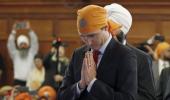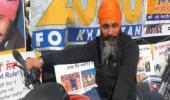Sikhs have more in the way of domestic clout and electoral representation in Canada than they do in India.
No politician in Ottawa can ignore a community with this level of representation, notes Devangshu Datta.

In the 1960s, the British government was rocked by a spicy scandal.
John Profumo, the secretary of state for war (defence minister, in other words) was 'friendly' with a 'model' called Christine Keeler, who was also 'friendly' with Commander Valery Ivanov, the Soviet naval attache.
Keeler first met Profumo at the house of another ruling party politician, Lord Astor.
She was also friendly with Mandy Rice-Davies, a 'model' with whom she shared living quarters. Rice-Davies was 'friendly' with Lord Astor.
The lid came off all these cosy 'friendships' when British Intelligence flagged the contacts as undesirable.
Stephen Ward, who was the 'accountant' for Rice-Davies and Keeler, was sent to jail for 'living off the proceeds of prostitution'.
At his trial, on the witness stand, Rice-Davies claimed a relationship with Astor, who denied it.
Her response was legendary: 'Well, he would deny it, wouldn't he?'
I was reminded of this quote when the recent diplomatic row between Canada and India blew up.
Regardless of the truth of the Canadian accusation, India has no option but to officially deny it.
Equally, given the long-standing links between Canada and India, the Canadians would not have made this public accusation without possessing what they believe to be strong evidence.
The latest reports claim that Canada cited both human and electronic evidence in making the accusation.
Denials and accusations apart, the domestic political compulsions and the geopolitical ones are interesting.
No nation likes its sovereign status to be ignored by another nation carrying out an extra-judicial killing targeting one of its citizens.
Equally, no nation likes to officially admit it has carried out such an action, whether it has indeed done so or not.
This situation has been brewing for decades and there are deep domestic compulsions in both nations that have led to this impasse.
India regularly accuses Canada of harbouring Khalistani sympathisers and terrorists.
Canada cites laws related to freedom of speech in saying that India cannot make blanket demands that Canadian citizens be prevented from expressing pro-Khalistani sentiments.
India has outstanding requests for the extradition of 20-odd Canadians who it accuses of being Khalistanis (apart from the late Nijjar) and the two nations have an extradition treaty.
But India has not been able to convince a Canadian court to order these extraditions.
The demographics indicate Sikhs (not Khalistanis, for we must absolutely make this distinction) form a more significant percentage of the population in Canada than in India.
According to the 2011 Census, Sikhs amounted to 1.7 per cent of India's population at around 21 million (out of 1.21 billion in 2011).
Given a low total fertility rate for the community, the percentage may have since dropped.
In the 2021 Census, Canada had a population of around 37 million and 770,000 of them claimed to be Sikhs.
That's over 2 per cent -- a higher percentage than in India.
Another 500,000 -- odd Canadian citizens are of Indian origin and there are around 300,000 Indian students studying there at the moment.
Canada has a bicameral parliament like India. The lower house is elected by a first-past-the-post (FPTP) system and it has 338 seats.
As of now, there are 18 Canadian MPs of Sikh origin.
India has a Lok Sabha with 543 seats and a total of five elected Sikh MPs.
In political terms, therefore, Sikhs have more in the way of domestic clout and electoral representation in Canada than they do in India.
No politician in an FPTP system is going to casually ignore the concerns of a community with this level of representation.
Justin Trudeau, who has a shaky position with only 158 sitting MPs from his own Liberal Party, is even less likely to do so.
In good times, when India is riding high diplomatically, our politicians claim that India has great reach and 'soft power' due to the large desi diaspora that has been so successful in so many countries. The soft power can cut two ways.
Feature Presentation: Aslam Hunani/Rediff.com












 © 2025
© 2025